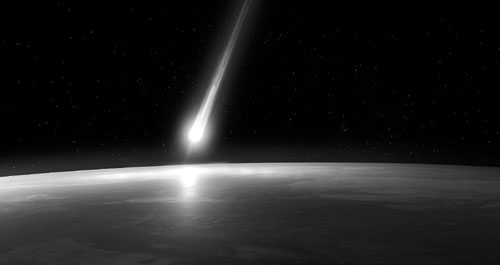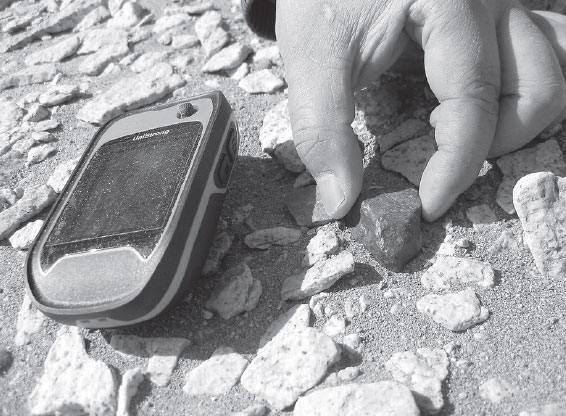Meteorite madness in an alien landscape
Updated: 2014-12-19 07:48
By Cui Jia(China Daily)
|
||||||||
As the market grows in China, a dedicated band of professionals are risking life and limb searching for extraterrestrial material in the deserts of the Xinjiang Uygur autonomous region. Cui Jia reports from Urumqi.
China Daily is publishing a series of reports focusing on efforts that help the country to move forward.
Zhao Yuxian always refers to himself as a "hunter", even though his prey doesn't originate on Earth.
"I'm looking for space rocks that aliens throw at us. Of course, most people call them meteorites," the 31-year-old joked as he spun a wedding ring made from an iron meteorite on his finger. "Meteorites can be as old as the Earth, so a ring made from one is a better way of representing eternity than diamonds."
Although the sky-high prices they fetch at auction has seen public interest in meteorites growing in China in recent years, the dangers associated with finding fragments mean that few people are active hunters.
To his peers in the Xinjiang Uygur autonomous region, a hardcore group of a few dozen professional meteorite hunters who prefer to be known by their nicknames, Zhao is "Falcon". He said the dry climate and flat topography of the nearby Taklimakan Desert make it one of the best places in the world, and certainly the best in China, to find meteorites.
Zhao was still excited when he recalled how in February he and two other hunters discovered a fragment of an iron meteorite in Lop Nur, a dried-out salt lake between the Taklimakan and the Kumtag Desert in Xinjiang. It was the only piece of extraterrestrial material he had found so far this year.
'Another planet'
"Discovering meteorites in the vast and depopulated Gobi, or any desert, is never an easy task, no matter how big they are. Sometimes when I look at the desert landscape I feel as though I am standing on another planet," he said.
Scientists have discovered that most meteorites, solid pieces of debris from sources such as asteroids or comets, survive impact, and most of the ones that land on Earth come from the asteroid belt, between the orbits of Mars and Jupiter.
Collisions in the densely crowded belt can cause asteroids to change course and head toward Earth, and because the asteriod belt was formed during the early history of the Solar System, they can be as old as the Earth, if not older.
According to Zhao, it's a little-known fact that meteorites hit the Earth every day.
Although collectively they can be measured in metric tons, many are as small as grains of sand, or are just space dust that no one notices, and meteorites with a diameter of about 1 millimeter hit the Earth about every 30 seconds.
"We hunt meteorites by examining and following the patterns in which they break away from the original meteor. The fragments become smaller and smaller the farther they are from the main point of impact. When we find one piece of meteorite, there are usually others nearby. What we need to do is work out the direction from which they hit our planet," he said.
Although the hunters use metal detectors to search for iron meteorites, which are mainly composed of an alloy of iron and nickel, when the space rock is made of stone, they have nothing to rely on except their eyes.
"When we find a meteorite, the first thing we do is to record its GPS and analyze its position, which can provide clues about which part of it hit Earth first. I am always fascinated by the journey the rock has to take from outer space to Earth," Zhao said. "Then comes the most rewarding part of meteorite hunting: We find it, dig it out, and give it a little kiss."
However, before 2010, Zhao, who has been in and out of the Lop Nur four times so far this year, knew nothing about meteorites. "I heard a news report that a fist-sized meteorite that landed in a village in Qitai couty in Xinjiang in 2009 had been put up for sale for 80 million yuan ($13 million). I became curious to know how a piece of ugly black rock could be that valuable," he said. "That was the time Chinese collectors began to invest in the meteorite market."
Scientific value
The Qitai meteorite was dug out by villagers who witnessed its descent. Because it's possible to pinpoint its point of origin in Earth and the date, it's the most valuable type of meteorite, Zhao said. "These types of meteorite are not only valuable because they sell for much higher prices - their value in terms of scientific research is also extremely high."
In November, an international team of researchers from China, Japan, Germany and Switzerland published research in a scientific journal claiming to have discovered evidence of biological activity inside a meteorite from Mars that landed in the desert in Morocco on July 18, 2011.
The meteorite, known as the "Tissint specimen", contained traces of carbon, and the scientists said the discovery could provide strong evidence that there was once life on the red planet.
In 2013, a meteor rained an estimated 10,000 tons of rock on the Chelyabinsk region of Russia. It was a once-in-a-century event, according to NASA officials, who described the meteor as a "tiny asteroid". The blast was the largest to hit Earth since the 1908 Tunguska incident in Siberia, when a meteorite strike flattened a forest.
The recent event left more than 1,500 injured, mostly with glass wounds from shattered windows, and attracted hunters from around the world, including three from Xinjiang. Sadly, they returned empty-handed, Zhao said.
He now owns a meteorite store in Urumqi, the capital of Xinjiang, called "Sky-traveling Stars", which has also become a club for his fellow hunters.
In addition to selling meteorites he and his peers have found, Zhao also sells space rocks he has purchased from sources in Russia, Argentina and the United States.
"Initially, I was drawn to meteorites because I thought I could make money from them, but now I just love the process of finding them and being surrounded by them. To me, they are the most beautiful and mysterious stones, and they might hold the answers to some of the big questions about life and the universe."
Zhao and two other hunters have decided they will return to Lop Nur on Dec 22, despite a drop in the seasonal nighttime temperature to - 20 C. "We are risking our lives every time we go to hunt in these hostile deserts. Wish me luck - not only that I'll find a few meteorites, but also that I'll return safe and sound."
Contact the writer at cuijia@chinadaily.com.cn

|
A meteorite "hunter" uses GPS to fix the location of an object his team discovered in Lop Nur, Xinjiang. Zhao Yuxian / for China Daily |
(China Daily 12/19/2014 page5)
Most Viewed
Editor's Picks

|

|

|

|

|

|
Today's Top News
China-US talks on trade, commerce conclude
Avon pays fine of $135m to settle bribery allegations
New observation system to boost maritime power
Japan, US delay defense guideline revision
China urges US to correct itself after WTO case win
Venezuela could seek China's help as oil drops
China, Chile seek enhanced trade, investment
'Made in China' helps Brazilian consumers
US Weekly

|

|
















